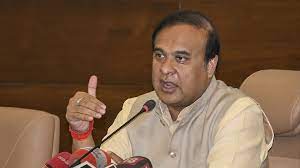In a development highlighting the intensification of political discourse, Himanta Biswa Sarma, a prominent political figure, issued a stern warning to Bhupesh Baghel, the Chief Minister, following allegations of a Rs 508 crore bribery charge in the Mahadev case. Sarma conveyed that the Enforcement Directorate (ED) would be brought into the fray to thoroughly investigate the matter.

The charged exchange comes against the backdrop of escalating political tensions, with the Rs 508 crore bribery accusation casting a shadow on the political landscape. Sarma’s firm stance and declaration of imminent ED involvement underscore the gravity of the situation and the potential legal ramifications.
The Rs 508 crore bribery charge, linked to the Mahadev case, has injected a new dimension into the political discourse, prompting Sarma to take a proactive stance in ensuring a comprehensive investigation. The invocation of the ED further amplifies the seriousness of the allegations, signaling a meticulous scrutiny of financial transactions and potential legal infractions.
Sarma’s warning to Baghel serves as a public declaration of intent to pursue legal avenues to address the allegations at hand. This development is likely to catalyze a thorough and impartial investigation into the Rs 508 crore bribery charge, with the ED expected to play a pivotal role in scrutinizing financial transactions and uncovering any potential wrongdoing.
The unfolding scenario underscores the complex interplay between political figures and legal institutions, emphasizing the imperative of transparency and accountability in the political sphere. As the matter progresses, the involvement of the ED is anticipated to bring forth a detailed inquiry into the alleged financial improprieties, shedding light on the veracity of the accusations made against Baghel.
As the political arena becomes increasingly charged with the Rs 508 crore bribery allegations, the standoff between Himanta Biswa Sarma and Bhupesh Baghel is poised to have far-reaching implications on the political landscape. The invocation of the Enforcement Directorate (ED) by Sarma signals a strategic move to address the allegations through legal channels, adding a layer of complexity to the unfolding scenario.
The ED, renowned for its expertise in financial investigations, is likely to meticulously scrutinize the financial transactions related to the Mahadev case. The involvement of such a specialized agency suggests a commitment to uncovering any potential financial improprieties and ensuring a comprehensive examination of the allegations at hand. This move reinforces the significance of upholding legal principles in the face of serious accusations within the political domain.
The public warning issued by Sarma also reflects the broader dynamics of political accountability and the expectation of transparency from elected officials. The Rs 508 crore bribery charge has captured public attention, and the ensuing legal proceedings are likely to be closely monitored by citizens, political observers, and the media alike. The outcome of the ED inquiry will not only influence the reputations of the involved politicians but may also shape public perception of the broader political landscape.
As the situation unfolds, it is crucial to underscore the importance of a fair and impartial investigation. The ED’s role in this process is instrumental, and its findings will play a pivotal role in determining the course of action that follows. The scrutiny of financial transactions will shed light on the intricacies of the alleged bribery case, providing a basis for informed decision-making and potential legal consequences.
In conclusion, the standoff between Himanta Biswa Sarma and Bhupesh Baghel, coupled with the impending ED inquiry into the Rs 508 crore bribery charge, elevates this issue beyond mere political rhetoric. The developments underscore the need for a thorough and unbiased investigation to address allegations of financial impropriety within the political sphere. The aftermath of this inquiry will undoubtedly shape the narrative surrounding political accountability and transparency, setting a precedent for similar cases in the future.